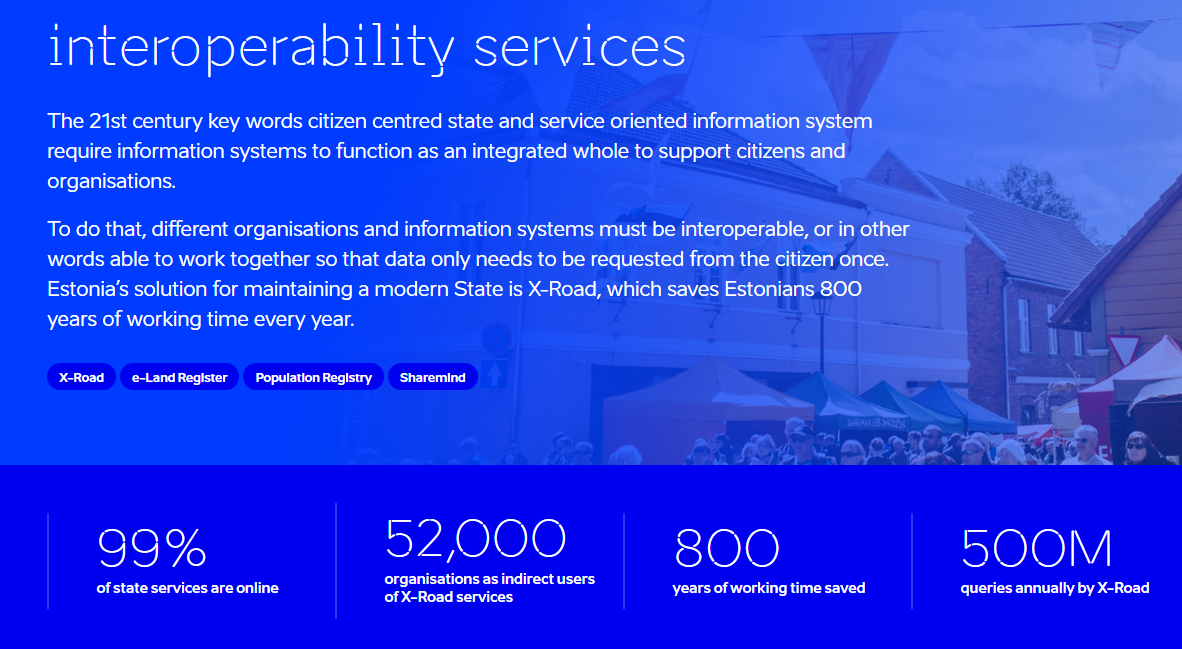Let's face it. Ottawa's Open Data portal is not a dream come true. It is proving to be a moderately useful tool - an agglomeration of searchable facts and a few interesting datasets.
What it does not do is offer a more online government. It does not really open up data on our elected officials. Yes, it is in the early stages of its lifecycle, but it could be so much more.
Imagine a system that joined the concept of open data with digitized government, creating a responsive government with services available 24/7, and data right at your fingertips.
I was reading this article recently about the digitization of Estonia’s government, and the subject really caught my attention. The entire concept is miles ahead of Ottawa's Open Data portal, and, to my mind, it is one of the most innovative ideas yet put into practice.
Perhaps we should pass the name "Silicon Valley North" over to Estonia.
If you don’t have time to read up on the topic, it boils down to this.
The government of Estonia has created a nation-wide platform based on blockchain technology, accessible to all citizens, and service providers. Individual privacy is highly protected, and any unauthorized record access is investigated. The platform allows a citizen to access all government services with their ID Card (mandatory at 15 and older), and it allows much easier data sharing between government services (i.e. the sharing of a patient’s drug history between pharmacist and doctor is instantaneous).
Estonia’s population, at 1.4 million, is comparable to the City of Ottawa’s population. The number of personal cards required for services, however, is significantly lower for Estonians (1), than for Ottawans (Driver’s License, Health Card, SIN Card, Passport, etc.). Perhaps we should pass the name "Silicon Valley North" over to Estonia.
The release of the OC Transpo Bus GPS API was a genius move by the City of Ottawa. The proliferation of free applications across Smartphones, and apps like Bus Buddy having more than 50,000 downloads, indicate a major success story.
Instead of building on this victory, in 2015 the city attempted to build an app to track Snowplows via similar real-time GPS data. The app failed, although the city has said they still use it behind the scenes. Releasing that data right away, as an API similar to the Bus GPS API, could have offered a mostly free solution to the public.
Hopefully the city can take the lessons learned from these digital operations to help build a better framework for digitizing services. An expensive lesson, when understood, should still be called a valuable use of resources. Innovation requires failure, and a government should have some leeway for failures in the burgeoning digital sector.
The Open Data Portal offered by the City of Ottawa is only the beginning of what can be accomplished. Combining the concept of open datasets with Estonia's always open government would usher in a new era of open government and improved services. Citizen developed apps would be accessible beside information on city services, and the spread of information would be easier and faster.
According to the e-Estonian website, X-Road, the platform that allows the transfer of data between services, has saved more than 800 years of working time in Estonia every year. Every year. If accurate, that is an incredible amount of time, and therefore money, saved.
The unfortunate fact is that there seems to be very little action on digitization, and the city's current strategic plan is to play catch up on digitization of services (check page 56).
Beyond information sharing, the Estonian model offers a much easier way to hold elected officials accountable. In Ottawa, we rely almost exclusively on journalists to keep our officials accountable. An Estonian can easily look up business and housing interests of their officials. The concept of a government that can be counted on by citizens, where facts can immediately be verified by anyone who wants to, is a significant upgrade over our current system of political accountability.
Adoption of this type of strategy will not be easy. It will require buy-in from governments, both municipal and provincial (and perhaps even the feds). It will need staff support, and support from citizen-led group and organizations. The trick is to keep the discussion in the public light at all times, and to ensure the benefits are always on display. While Estonia's system has had issues, the fact is that identity theft has been prevalent in modern societies for a long time, the Better Business Bureau estimates it costs consumers, banks, credit card companies, stores and businesses over $2.5 billion annually in Canada..
Moving towards a fully digital government would make Ottawa one of the most innovative cities in North America, and it would help buoy its worldwide image as Canada's answer to Silicon Valley.
More importantly, such a strategy would help put the citizen first. Seeking to reduce waste, improve service access and delivery, and keep private data private are a winning combination for a satisfied populace.
The time is now. The pieces that make up our world are slowly being upgraded to become autonomous, and connected. Smart buildings, self-driving cars, AI-run Traffic Systems, even PRESTO-like smartcards, are all being deployed worldwide. It is up to our elected officials to accept this trend, and begin to grasp the digital future. The sooner this happens, the easier and cheaper the transition will be.

